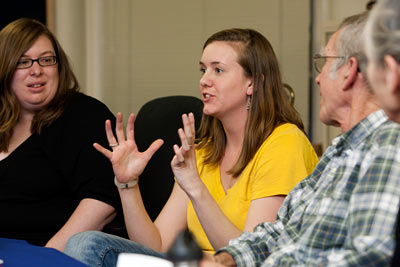Peace Corps offers competency, perspective, say panelists
By Farrah Tan

Serving in the Peace Corps is not only life-changing, but it also stands out on resumes, said five former Peace Corps volunteers, March 2 in a Barnes Hall panel discussion. The event was part of Peace Corps Week, March 1-7.
"It shows that you have intercultural competency and gives you a lot of credibility," said Donna Ramil, who volunteered in the Philippines in the late 1980s and is associate director of international programs and student services in the ILR School; she previously worked at the Cornell Career Center. She added, "The Peace Corps is the only way you, as a fresh-out-of-college American, will have the privilege of getting paid to live in a developing country."
This year Cornell ranks No. 3 among medium-sized colleges and universities nationwide among Peace Corps volunteer-producing schools. Cornell also stands out as producing more Peace Corps volunteers than any other Ivy League institution in 2009.
Moderated by B.J. Whetstine, a Peace Corps recruiter who served in China in 2003-05, the panel attracted about 20 students. The panelists, all Ithaca residents, talked about the challenges and rewards of leaving the American mindset behind to fit in with the local people.
"Basically, people are the same in every place. They care about their family, just as we do. When they realize you are on the same page, you will fit in with them," said Blythe Baldwin, who with her husband, Frank, and their two young children served in Afghanistan in 1966-68; the family has periodically gone back to visit because they loved the people.
Rachel Golden, program house director for the Holland International Living Center and Just for Music at Cornell, detailed the youth improvement work she did in 2002-04 in one of the poorest areas in Guatemala: "I remember convincing one family not to let their daughter drop out of fifth grade when sixth grade was the highest education level for many children. Now she's graduating from high school. It changed her life and her family."
Laura Smith spent two years in Mauritania, West Africa, a location Whetstine said was one of the toughest places for volunteers. "The Peace Corps provided me with money to live, a network with other volunteers and language training," Smith said. Upon her return to the United States, she said she realized she viewed the world differently: "I felt that all of our everyday problems were not real problems anymore."
Students at the event said it was informative. "I thought it was very helpful that the panel was unbiased. Personally, it raised a lot of questions for me about whether this is my next career step," said Tracey Hsu '10, a policy analysis and management major.
Elliot Kulakow '10, an applied engineering physics/computer science major, asked how an engineer might contribute. Whetstine replied that engineers can work on civil or environmental engineering projects, teach math and science, or do something entirely unrelated.
Farrah Tan '10 is a writer intern for the Cornell Chronicle.
Media Contact
Get Cornell news delivered right to your inbox.
Subscribe